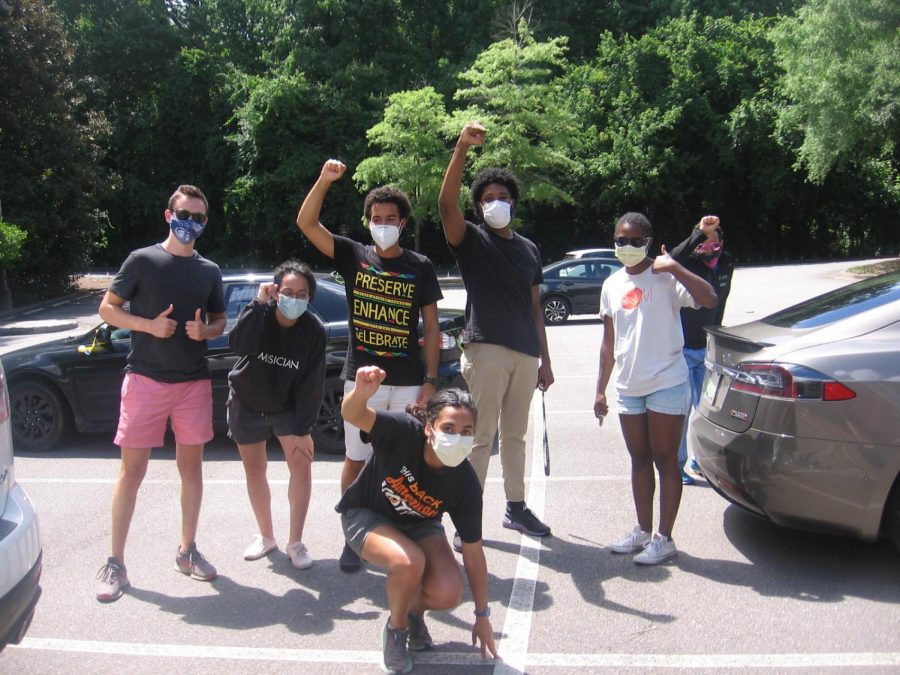Rise of Anti-Protest Laws Correlate to Rise of Fascism
Roswell students participating in a caravan protest on canton street this summer. Students include seniors Erin Lanier, Rajath Prabhakar, and April McBride. Photo Credit: April McBride
November 4, 2020
In the last four years, thirty-six states have passed some form of anti-protest laws. These have mostly come as a preventive measure after the 2016 South Dakota pipeline protests to ensure a event similar will not happen in other states. The push to stop similar protests is to protect huge corporations and government property, even if they are ruining land, poisoning water or harming citizens. The Dakota protests are a testament to what people were willing to accomplish even in the face of state violence. Sadly, in 2017, Trump overturned the original decision made by Obama to halt construction on the pipeline and protestors were forced out. What was left was a opportunity for legislators introduce anti-protest laws.
A few days after the final groups moved out of Standing Rock, the House of Representatives in Oklahoma voted on a set of bills that would limit a similar protest happening in their state, where about 7.4% of the population is indigenous. The first one passed, HB 1123 was used to create high penalties for trespassing on or damaging of property that is considered a “critical infrastructure facility”. This term covers about ten different types of structures including oil pipelines, electricity structures, dams and water processing plants. If you are caught causing damage to or even just physically on these structures you could face up to a $150,000 penalty, 12 years federal prison time and a felony charge.
The bill’s author, former representative Scott Biggs, has stated that even though this is not a protest bill it stems from the incentive to prevent protests. “Across the country time and time again we have seen protests get violent, this is a preventive measure,” he said.
The second bill, HB 2128 written by representative Mark McBride, states that any damages to these properties will make people on them vicariously liable for any costs to rebuild. Despite protests both from Oklahoma’s American Civil Liberties Union and other human rights groups, they were signed into law early in 2017.
Oklahoma was not the only state to pass similar laws around this time but what makes these two laws so important is that their language is used as a model policy, by the right-wing organization ALEC, a group that gets model policy in front of other local and state politicians. Meaning bills directly recreated from those in Oklahoma to prevent protesting could spread nationwide.
The most dangerous of these model policy bills is one found in Ohio, Senate Bill 333. This has generalized the original to such an extent that even offering medical help, rides, food or supplies to violators of the law will count as assisting them to destroy property. It is so wide that even shouting along with protestors or walking with them could penalize you. Fortunately getting this bill passed will be a battle; a federal judge ruled against a South Dakota bill in 2019 with similar language.
Whether these bills are passed or not, it is important see the infiltration of anti-protest language growing across America. It shows a clear uptick in fascist language. This language does just exist in a legislative body but in the groups they represent.
After the early 2020 Black Lives Matter protests, hordes of people, some traveling over state lines, came to attack and run over protestors. The values these people hold against state accountability is echoed clearly in history of Nazism and Fascism, and if those values are also held by those working in our government, what does that make them? Within Nazi Germany groups of protesters were shamed and arrested at first and by February 1943 were guillotined for opposing the state, specifically the case of college students from Munich University. The general attitude that if an individual has broken any laws while protesting that they deserved any charge or even fate coming to them is another inherently fascist ideal. Laws are being passed to slowly limit protesting, and to create the idea that breaking any laws, even in the fight for your life means that your issue is malevolent.
Stopping the spread of these undemocratic laws, and the language that comes with that is to stop villainizing protestors, victims of state violence and marginalized groups all together. The work to stop fascism and protect democracy is to actively support and join these groups, no matter how small your contribution. Organizing within your own community is one a step you can take to personally protect the right to protest. You can also send emails, letters and message to your state and local governments to convey your opinion on these laws.


